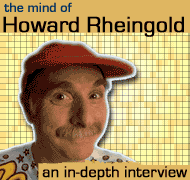
photo by Marcellus
Amantangelo |
Dan
Richards talks with cyberspace guru Howard Rheingold.
Part two of
a two-part interview.
page 1 of 3
continued
-->
|
Read
part one first.
Continuing
with a series of "talks" that took place throughout July
and August during the scorchy summer of 1999.
Dan Richards: So, your experience has been that
virtual community environments stand a better chance of providing
fertile ground when allowed to grow organically over time in smaller
barrels?
There is definitely an idea that seems to be in the air after
some time -and we can now see an "experiment" such as
the Well compared to the larger so-called communities like AOL.
In this case, smaller appears to be better. Less is more. Would
you agree, or am I comparing apples to orangutans?
Howard Rheingold: Yes, I think you are making
a category error. There are plenty of communities within AOL. Building
communities is not AOL's business, however, judging from their actions
and not their words. Those communities within AOL thrive for the
same reason that communities thrive within the WELL, because the
members have a strong enough affinity, and put in the work, to keep
them together.
DR: Howard, I'm thinking about the world of ideas.
You've written about and have an interest in the subject of memetics.
For those of us who are new to the world of memes, could you give
us a general introduction -and perhaps steer us towards some further
resources?
HR: My agent, John Brockman, runs an interesting
forum called The Edge Foundation. You can find a lot of fascinating
speculation from very solid scientists and scholars at Edge.Org.
I also highly recommend the piece "THE EVOLUTION OF CULTURE"
by Daniel Dennett, who is the first person who has done some rigorous
thinking about Richard Dawkins' notion of "meme," which
seems to have been new-age-ized by less rigorous thinkers.
DR: What, in particular, do you find compelling
about memetics?
HR: I am an interested skeptic. We need a richer
vocabulary for talking about the way ideas propagate, but I'm suspicious
of extending the biological evolutionary metaphor.
[ Audience comments on asking Howard more questions. ]
HR: I am happy to indulge in answering people's
questions, but I'm not altogether comfortable being a center of
attention. I know that sounds strange, considering my image, but
it's true.
I am basically shy. My Judy convinced me that the world wasn't
going to beat a path to my door, so I started inventing a more promotional
persona around ten years ago. I've always dressed funny, but never
really advertised it. Then I started working the press, figured
out what they wanted and how it could draw attention to my writing,
and by the time Electric Minds was launched, I had my black belt
in media self-promotion. I went all-out on the "Howard as brand"
thing, and discovered that Adam [an audience member] is right. I
also know that it skews perceptions in communities like this when
people treat me too specially. I just want to be one of the group
here. And I still talk to the press, but now I concentrate on a
few key messages that I feel need to go out, and I turn down more
interviews than I accept.
Having said that, I'm happy to continue this. I just want to make
my position more clear.
continued
-->
|